AFL draft 2019: Former coach Brendan McCartney reveals what traits lead to draft success
From bringing scales to the player who didn’t speak to the dirt road runs. Ex-coach Brendan McCartney reveals his most memorable stories and first impressions of the game’s superstars from their draft interviews.
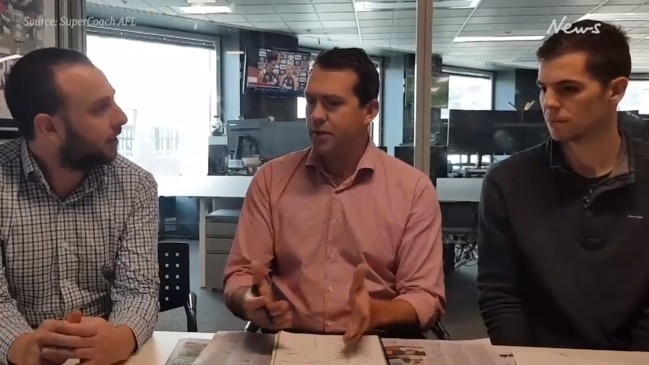
Draft news
Don't miss out on the headlines from Draft news. Followed categories will be added to My News.
Clayton Oliver knew it was coming.
When Melbourne coach Simon Goodwin first met “Clarry” late in his draft year, Goodwin said next time they saw each other he would have a pair of scales.
Oliver had a fantastic second half of the TAC Cup season but was still learning about what the game required at the top level.
Stream the full or condensed replay of the 2019 Toyota AFL Grand Final on KAYO SPORTS. Get your 14 day free trial and start streaming instantly >
He had to lose some weight.
So, when the Demons interviewed Oliver at the draft camp, Goody had a pair of scales with him.
Oliver didn’t hesitate. He just jumped straight on. That showed me, there and then, that Clarry had great spirit.
Similarly, I never saw him flinch in a contest. He has really special qualities.
The closer he gets to the ball, the harder he goes at it.
Western Bulldogs’ Marcus Bontempelli is the same, these days, not because it was always there but because it has been moulded and crafted.
For as much as recruiters get criticised for picking players who may not go on to long careers, Melbourne’s Jason Taylor and former Bulldogs recruiting manager Simon Dalrymple (now at Sydney) and their recruiting teams deserve great credit for identifying these two.
For different reasons, neither Bontempelli nor Oliver was talked up as a top pick midway through his draft year.
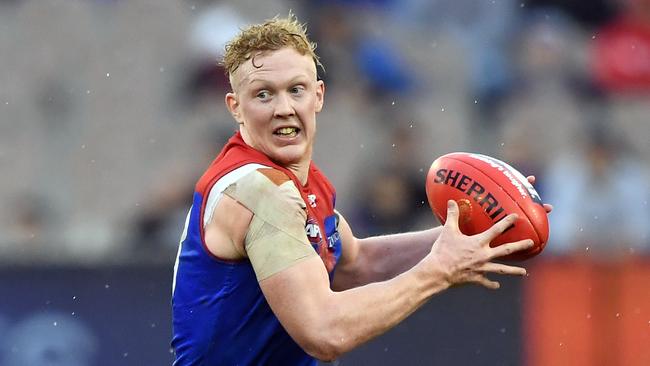
“Bonti” wasn’t always in the game, but when he was you just thought “wow”.
I’ll never forget meeting his family for the first time, including parents Carlo and Geraldine, and having a beer and wine and a great conversation around their fire, and just how comfortable it all felt.
That same night Goody almost sat on and squashed their pet dog but thankfully no damage was done.
These are the players you can build a club around.
WELLS-ROUNDED
When Joel Selwood spent a week with the Cats before he was drafted, Kenny Hinkley and I asked Stephen Wells if he could lock him up in a back room and keep him.
After drafting Joel, he was slow to begin full training because of his knee injury, not that it mattered.
I still remember his first contested training drill. He exploded into a stoppage and it was absolute carnage.
Joel always had this burning ambition in his eyes. He wanted to be great and he wanted to be part of a great team.
Matthew Scarlett had a natural self-assuredness and confidence.
I remember Bomber Thompson asking him early on, “Are you better than these guys in the team?”
Scarlo just looked him in the eye and said, “Yep.”
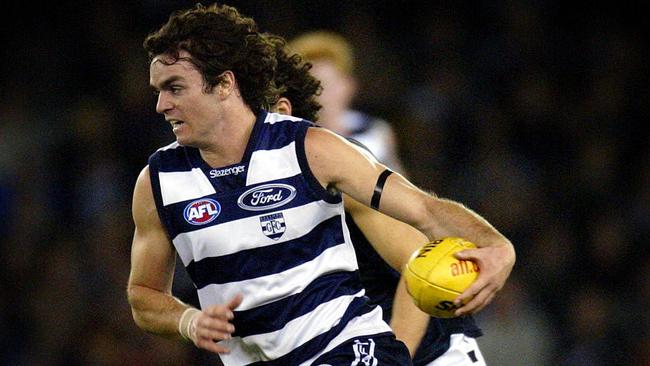
I didn’t see it as an arrogant boast but someone who knew what he was capable of.
Bomber gave him some feedback about getting bigger and stronger and he just said “Yep” and went away and trained and lifted in the gym with real intensity.
Joel Corey, on the other hand, virtually didn’t talk in his draft interview.
But Wellsy knew him really well and loved his humility, and his competitiveness.
I have always been a big believer that the best way to build your team for the long term is through the draft.
It’s why the next 48 hours is so important for clubs.
You want to work out as a club what you want to achieve, then go and find people and players who fit your mould.
MORE NEWS:
Gary Buckenara’s top 50 draft prospects
Crows never confident about Grundy’s desire
Blues zero in on Josh Kelly clone
For me it’s always been about taking competitive kids with plenty of character.
A competitive person is someone who is always looking to improve themselves, and, if they lose a contest, they are immediately asking themselves and others “Why did I lose that? What can I do to get better for the team?”
Steve Johnson was that person.
We all saw him kick goals from many angles and the sublime skills, but the thing that first stood out about Stevie was that he was an animal around the ball.
He hated getting beaten.
LISTEN UP, KID
But competitiveness is not just your Selwood and Jack Viney types.
There is fierce competitiveness in Lachie Hunter and Jack Macrae who keep running when others can’t, whether it’s to win an important ball or just help to support a teammate.
Melbourne’s greatest coach was Norm Smith.
His philosophy was based on outnumbering your opposition at the contest. I remain a firm believer in that.
But there are some other qualities which have stood out to me in players over more than 30 years in the game.
When I think back to the great drafts such as Geelong’s in 1999, when the club took Paul Chapman, Cameron Ling, Corey Enright and Joel Corey, yet missed out with some other high picks, some great lessons came out of it.
Often the ones who thrived were great listeners.
Players can question and discuss what they’re told, but ultimately when it came to their craft and receiving feedback, they listened and took it on board.
Having a work ethic and also having a respect, love and admiration for the game is also crucial.
After Ling’s first season, Bomber gave him some feedback and he went away that summer and worked as a brickie’s labourer.
He turned himself into an endurance beast.
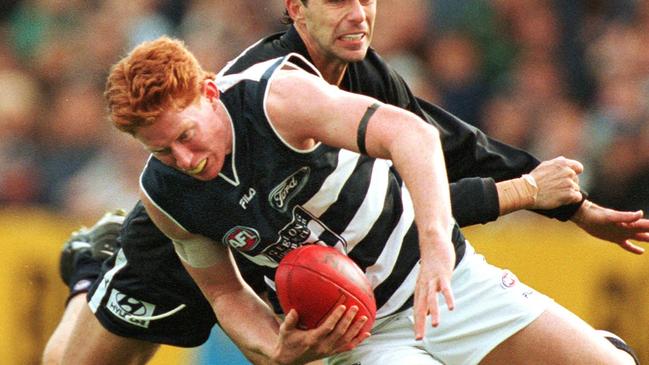
Enright was one of the greatest picks in draft history.
But after his first season, he had to get fitter.
He went back to Kimba, where there were no fancy gyms, and came back as one of the fittest blokes at the club. He did it by running on a dirt road.
That’s the kind of drive and determination that sets the building blocks of your club — that integrity and character.
PRESSURE GAME
Self awareness is also a key quality.
Those who shone generally knew where they were at with their games, and what they needed to work on.
It meant when you broached things with them it generally wasn’t a shock.
Those things generally underpinned an ability to deal with the stress and anxiety of the game at the top level. There’s huge pressure on everyone.
We should never forget how demanding the game is on players, and especially young people.
Young men are still maturing in their mid 20s.
One night Geelong had a big win at Marvel Stadium and “Bomber” had seen some things, some trends, that he didn’t like.
As a coach, you’ve got to be continually striving for improvement and looking for things which could trip you up down the track.
So, Bomber was talking about some small issues and I remember Jimmy Bartel, without even really putting his head up, said “it’s easy from the second level”.
It’s something that really stuck with me.
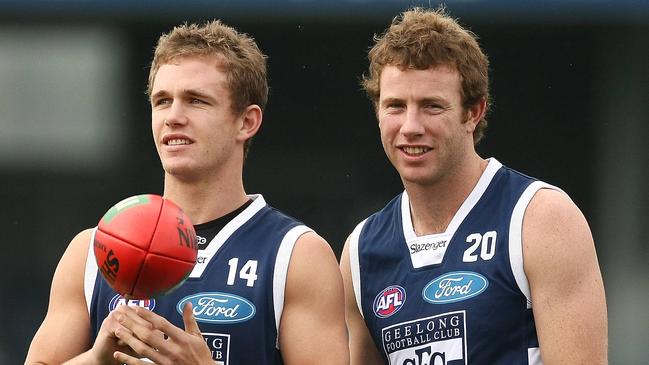
Patience is important. Having faith in players who continue to find improvements in their game year by year, even though there are ups and downs, peaks and troughs.
Only the really special ones can find elite consistency in their first three years in the game. Selwood, Chris Judd and Lance Franklin did, but it’s a small group.
It wasn’t a bed of roses for Jimmy early and he had to work through some things early on in his journey to become a Brownlow medallist and triple premiership champion.
Brad Ottens’ first training session at Richmond was memorable, albeit for the wrong reasons.
He had a big night the night before with his mates and the Tigers had already been training for a month by that point.
But big Otto — who has a heart of gold, is a really sociable bloke, and is one of the greats — had a pretty poor first training run.
At times it looked like he hadn’t played the game, and his new teammates thought, “wow, this guy was pick two”.
After training, you could see how upset he was with himself, but Richmond’s coach at the time, Jeff Gieschen asked me to spend some time with him the following day.
We went for a kick-and-a-catch and a walk-and-talk and once he had settled a bit, he started kicking set shot goals off a few steps from 55m out.
That’s when I thought the kid is going to be all right. He turned out OK.
— with Jay Clark
Originally published as AFL draft 2019: Former coach Brendan McCartney reveals what traits lead to draft success
